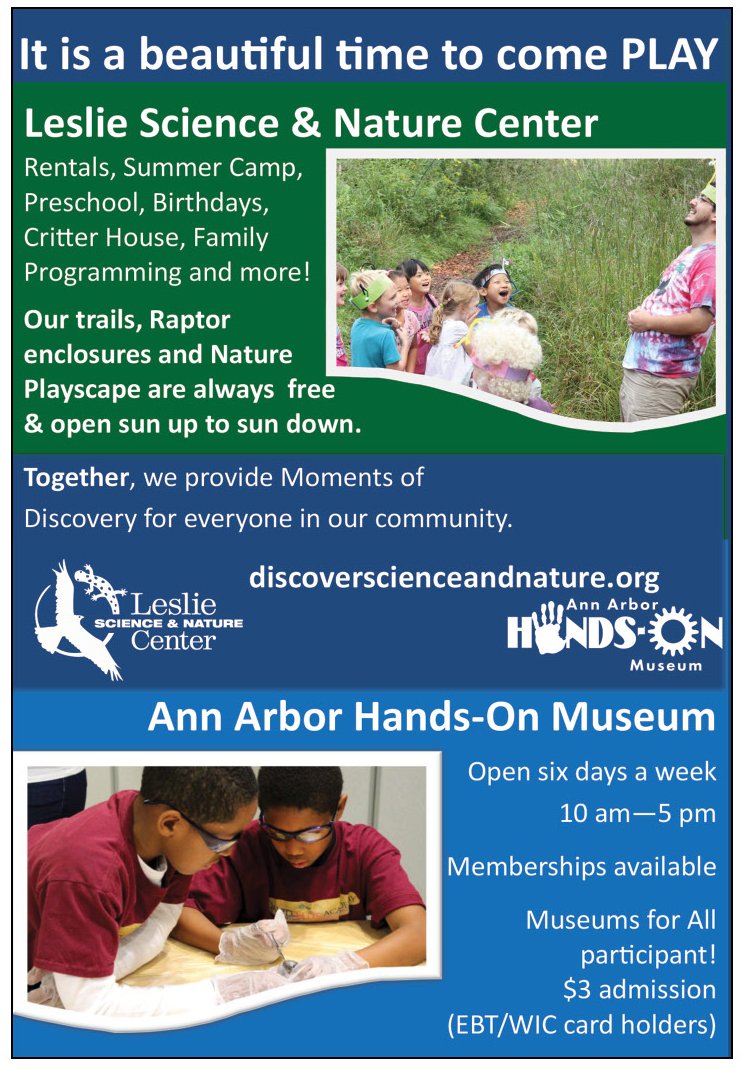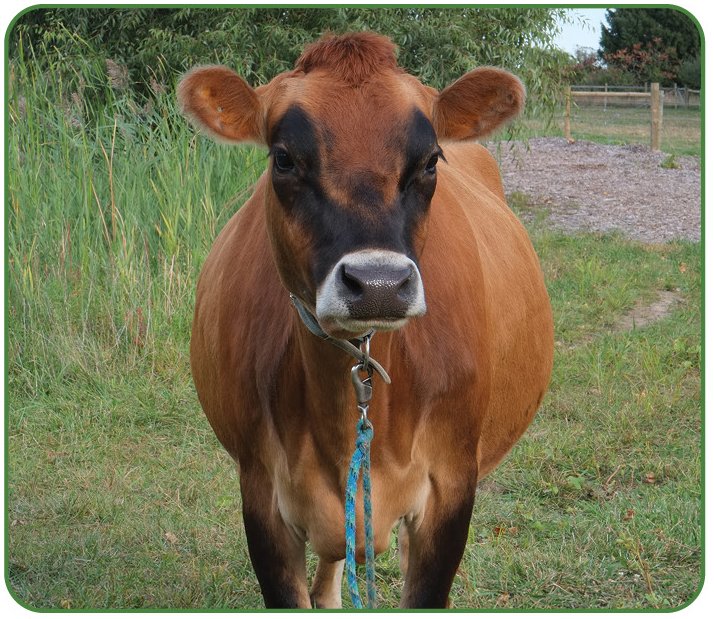By Cashmere Morley
There is a feeling of peace in the cowbarns at Goloka Eco Experience in Maybee, Michigan. The farm air feels crisp as it enters the lungs—unequivocally more clear than city air. In this moment, the gentle thud of a heartbeat or thwap of a tail against the ground is one’s only soundtrack against the world. Soft, big brown eyes peer out from underneath impossibly-long eyelashes, begging for pats on the head or scratches at the nape of the neck. Goloka Eco hosts an experience one simply cannot find among the hustle and bustle of regular everyday life--an invitation to be present. To come sit. To forget about time for a while. To cuddle a cow, as volunteer Karunasindhu Nitai Gaura Dasa says, is to form a “meaningful relationship.”
The AirBNB experience began in 2020, after Dasa and other Goloka Eco volunteers felt like the burgeoning stress of Covid was emotionally weighing everyone down. During that time, Dasa, who works in the automotive industry, would get off of work and come to the farm to cuddle with the cows to unwind. He would often leave the farm feeling more relaxed and centered after the experience–which led to him to wonder if others would benefit from cow cuddling, too.
“Initially, we started [cow cuddling] without charging people. And then we thought, why don’t we charge a minimum fee so that we can also support the cause? Because during winter, we were struggling a little bit to feed the cows, because hay prices were going up. So, we opened [cow cuddling] on AirBNB Experiences. It took off from there.”
Goloka Eco is a nonprofit organization that runs this experience, and others on the farm, solely through the work of volunteers. The farm was obtained in 2019, and cow cuddling began a year after that.
Dasa said cow cuddling is an “ancient activity” that has been part of Indian tradition for thousands of years–he notes that his grandmother had a cow, as did her mother, going back for as far as he can remember, though he noted that cows and their importance are not only tied to Indian tradition. The psychological evidence of animals helping aid depression, anxiety, and sadness is nothing new, but Dasa said cows have an “added benefit” because “they have a lower heartbeat, and their body temperature is warmer, so they act like a warm blanket when you hug them.” He adds, “They are also excellent listeners.”
Dasa’s deep bond with the herd is evident–the cows will come running to him like puppies if their names are called; his favorite cow, Padma, is quick to smother Dasa with nuzzles at almost every opportunity he can find.
“I’m not supposed to have a favorite,” Dasa said with a smile, “...but Padma is my favorite boy. He was a surprise baby. We never knew he was coming. And when he was born, he didn’t have colostrum. (The nutrient-rich milk that helps in the development of immunity in the newborn.) So, we had to take him to the Ohio State University and do a blood transfusion. And the doctors were asking ‘why are you paying this much money for a $50 calf?’ But he meant a lot to us. He was born at the farm and he was part of the family. He escaped death once. Besides that, his demeanor is also very soft and he’s the first one to approach me and he has a lot of affection.”
Escaping death once raises the question, just where did these cows come from in the first place? Enter Yashoda, mama cow and top-tier cuddler.
“There are seven cows total on the property, now,” said Dasa. “Three cows, two adults and one calf, on the property were rescued from the previous owner who had the farm. He told us that he could ‘take care of the cows’ ....basically, slaughter them, if we wanted, and we said no, we will keep them. In so many ways we rescued them from the previous owner when we acquired the farm. And then I thought, okay, the new calf was lonely. Let me get another one. So, I got another one from an Amish farm far away.”
A three-hour drive to an Amish farm in Grand Rapids proved fruitful, and Dasa returned to Goloka Eco with Yashoda.
“The Amish farmer thought she would never have a baby because she had a bowed leg, and having a bowed leg means she can’t carry the weight of the baby during pregnancy. If a cow cannot have a baby, she goes to slaughter, because there’s no use for a cow who cannot produce milk. We took her in, and then nine months later, we saw her licking something on the ground... and we went to investigate, and it was a calf.”
It was then that Padma entered Goloka Eco, or as Dasa puts it, the farm grew “from three to four to five by surprise.” No one knew Yashoda was pregnant when they adopted her.
After that came another birth, during which time Dasa went out to seek yet another calf so the newborn “wouldn’t be lonely.” The new calf he adopted was so skinny and frail, Dasa could pick him up himself and put him in the back of the car.
“We call them a herd, but you know, within the herd, you can see how they take care of themselves,” said Dasa. “And once you start interacting with them, and brushing them, cuddling them, you kind of become part of their family, and they tend to reciprocate in that relationship. You form a deep bond, a deep relationship with the cow. People are looking for meaningful relationships in this world. When you can develop deep relationships with animals, that’s also rewarding,” said Dasa.
“To me, this experience is for people to form a deeper relationship with animals and hence feel nourished by that. We want them to meet their meat—to understand that these animals have a profound sense of emotion. When the visitor goes home, they can also think a little bit deeper about the animal they are eating. These animals have personalities; they have likes, dislikes.”
If someone is hesitant to try cow cuddling, Dasa recommends beginning the experience with gentle mother cow Yashoda.
Upon entering the cowbarn, some hay will be nestled in the cow stable for a visitor to sit. A guest can lay right against the cow; Cows love to be nurtured and shown physical affection just like a common house cat or dog. For $40 a person, a guest can brush, hug, and even milk the cows. The AirBNB experience lasts an hour, and visitors can sign up year-round. Guests may even be pulled around the farm in a cart by the cows if the weather is right.
“Winter is the best time for cow cuddling because the cows are fluffier,” said Dasa, “and there are less flies. Plus, in winter, most people are inside, and the weather can be depressing at times, so it’s a chance for everyone to come out and do something fun.”
While cow cuddling can be done as a group experience, Dasa recommends going solo or with one other person—keeping the group as small as possible allows for a deeper bonding experience. Do not wear open-toed shoes and choose attire that can be cleaned easily.
Describing cow cuddling in a phrase, Dasa said it is “heart-transforming.”
“You come here, and you feel a lot of love,” said Dasa. “Love is a word that’s been thrown around, but love is an act of service. It’s more of a verb than a noun. When you love someone, you do service, and when you serve the cows by brushing them, taking care of them, milking them, you see their affection. You will genuinely see the affection back. When you call their names, they come running.”
Goloka Eco is located at 9756 Ferder Road in Maybee. They host the cow cuddling experience Friday through Sunday, mostly during the evenings. Search for “Cow Cuddles, a Bovine Therapy’’ on AirBNB or go to golokaeco.com/cow-sanctuary to see the available times to experience cow cuddling at Goloka Eco Experience.
































































































































































































Living on a farm in Chelsea, Ramsey’s journey from community developer and social worker to shamanic practitioner and animal chaplain exemplifies an authentic evolution of one’s unfolding of identity, own healing, and epiphany in recognizing one’s place within the actual world contrary to the confines and misperceptions of society.